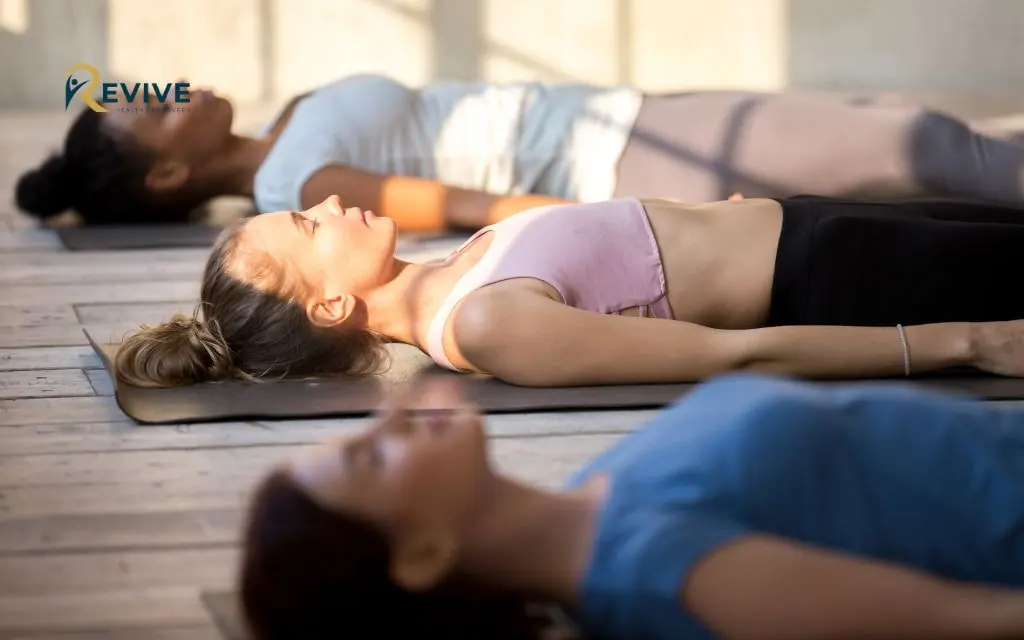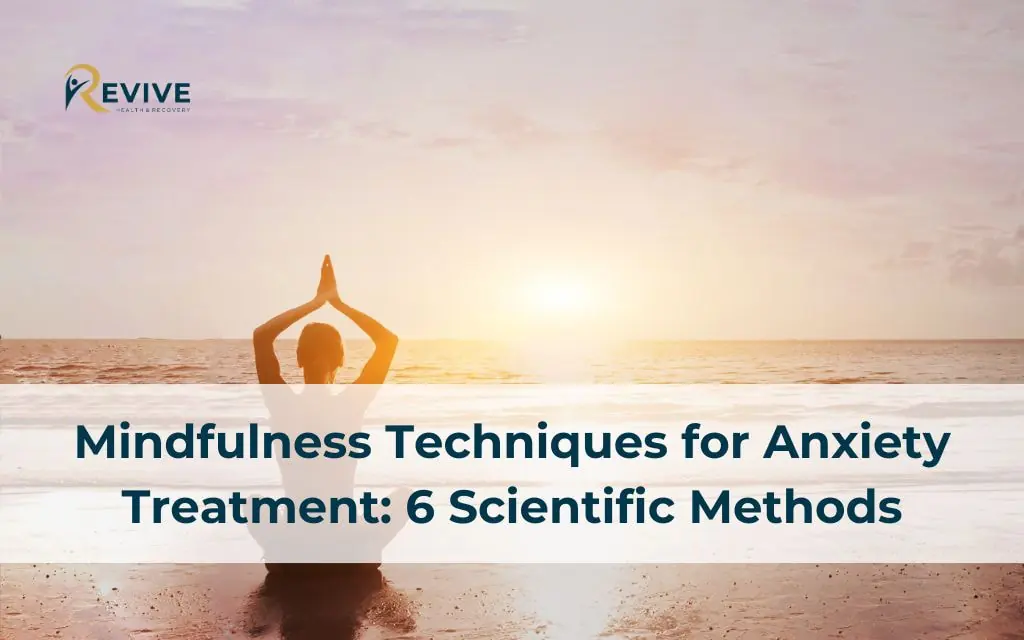Mindfulness represents the practice of maintaining moment-by-moment awareness of our thoughts, feelings, bodily sensations, and surrounding environment. In anxiety treatment, mindfulness serves as a powerful tool that helps individuals recognize anxious thought patterns and develop healthier responses to stress triggers. Research from institutions like Harvard Medical School and the National Institute of Mental Health consistently demonstrates mindfulness’s effectiveness in reducing anxiety symptoms by up to 50% among regular practitioners.
At Revive Health Recovery, we understand the challenges of finding effective, non-pharmaceutical approaches to anxiety management. This article will guide Denver residents toward evidence-based mindfulness techniques, qualified therapists, and accessible programs to incorporate these powerful practices into daily life.
Understanding Mindfulness Techniques for Anxiety Treatment
What is Mindfulness-Based Therapy?
Mindfulness therapy integrates meditation, conscious breathing exercises, and present-moment awareness practices to address anxiety at its root. This approach teaches individuals to observe their thoughts without judgment, creating space between triggering events and automatic reactions.
Two influential figures have shaped modern mindfulness therapy:
- Jon Kabat-Zinn developed Mindfulness-Based Stress Reduction (MBSR) at the University of Massachusetts Medical Center in the 1970s, creating a structured 8-week program combining meditation with yoga.
- Thich Nhat Hanh, a Vietnamese Zen master, introduced Western audiences to mindfulness through accessible practices focused on breath awareness and present-moment living.

How Mindfulness Helps Reduce Anxiety
Mindfulness targets anxiety through multiple mechanisms:
- Physiological regulation: Regular practice activates the parasympathetic nervous system, countering the fight-or-flight response that characterizes anxiety.
- Cognitive perspective: Mindfulness develops metacognition—the ability to observe thoughts rather than become entangled in them—allowing practitioners to recognize that anxious thoughts aren’t facts.
- Emotional resilience: By practicing non-judgmental awareness, individuals develop greater tolerance for uncomfortable emotions, reducing avoidance behaviors that perpetuate anxiety cycles.
6 Popular Mindfulness Techniques for Anxiety Treatment
1. Breathing Exercises to Calm Anxiety Instantly
Conscious breathing serves as an anchor to the present moment, interrupting anxiety’s forward-projecting worry cycle. When practiced regularly, breathing exercises recalibrate the autonomic nervous system, reducing the physiological markers of anxiety like elevated heart rate, muscle tension, and shallow breathing.
Breathwork directly activates the vagus nerve, which controls the parasympathetic nervous system responsible for rest and relaxation. This physiological response counteracts the stress hormones that fuel anxiety. Many relaxation techniques for anxiety begin with this foundational practice.
Box breathing (4-4-4-4 method) involves inhaling for 4 counts, holding for 4 counts, exhaling for 4 counts, and holding for 4 counts before beginning again. This technique is favored by Navy SEALs for stress management in high-pressure situations.
The 4-7-8 breathing technique (inhale for 4, hold for 7, exhale for 8) triggers the body’s relaxation response. Dr. Andrew Weil, who popularized this method, recommends practicing it twice daily for anxiety prevention.
Alternate nostril breathing balances both hemispheres of the brain, promoting emotional equilibrium. Research shows this technique effectively reduces anxiety while improving cardiovascular function and respiratory efficiency.
2. Meditation for Anxiety: A Beginner’s Guide
Mindfulness meditation trains individuals to observe their thoughts without attachment, reducing anxiety’s power. Regular practice creates lasting neuroplastic changes in the brain, particularly in regions responsible for stress regulation and emotional processing. Meditation for anxiety is becoming increasingly recognized as a first-line approach to treatment.
Meditation for anxiety treatment focuses on developing present-moment awareness, which counteracts anxiety’s future-oriented worrying. Studies demonstrate that even brief daily meditation sessions can significantly reduce anxiety symptoms within 8 weeks.
Step-by-step guided meditation for anxiety relief:
- Find a quiet space and sit comfortably
- Set a timer for 5-10 minutes
- Close your eyes and focus on your natural breathing
- When thoughts arise, acknowledge them without judgment
- Gently return attention to your breath
- Continue this process until your timer sounds
Research published in JAMA Internal Medicine found that meditation programs demonstrated moderate evidence of improved anxiety symptoms. Participants practicing just 10 minutes daily showed reduced anxiety scores comparable to some medication treatments after 8 weeks.
3. Yoga & Mindful Movement for Anxiety Relief
Yoga combines physical postures, breathing techniques, and meditation to create a comprehensive anxiety treatment approach. The practice helps release physical tension while calming mental activity through focused attention on body sensations and breathing patterns. Yoga for anxiety has strong clinical support as an effective intervention.
The mind-body connection activated through yoga and tai chi reduces cortisol levels while increasing GABA production – a neurotransmitter that helps regulate anxiety. This biochemical shift creates both immediate calming effects and long-term resilience to stress.

Anxiety-reducing yoga poses include child’s pose, legs-up-the-wall, and standing forward bend. These postures activate the parasympathetic nervous system while releasing tension from areas where anxiety typically manifests physically.
Denver offers exceptional yoga classes for anxiety relief, including Samadhi Center for Yoga’s “Yoga for Anxiety & Depression” workshop and The River Yoga’s trauma-informed classes. The Freyja Project specializes in therapeutic yoga specifically designed for mental health conditions, including anxiety disorders.
4. Body Scan Meditation: How to Release Tension & Anxiety
Body scan meditation systematically directs attention through the entire body, identifying and releasing physical tension that accompanies anxiety. This practice builds interoceptive awareness – the ability to sense internal bodily states – which research links to improved anxiety management.
This technique helps with grounding by anchoring awareness in physical sensations rather than anxious thoughts. The practice creates a clear connection between mind and body, allowing individuals to recognize early physical signs of anxiety before they escalate.
Step-by-step body scan practice:
- Lie down in a comfortable position
- Beginning at your feet, bring awareness to each body part
- Notice any sensations without trying to change them
- Consciously release tension as you move through each area
- Continue slowly moving attention up through your entire body
- Complete the practice with awareness of your body as a whole
Popular apps with guided body scan meditations include Headspace’s ‘Body Scan for Sleep,’ Calm’s ‘Release Tension,’ and Insight Timer’s collection of body scan practices ranging from 5 to 30 minutes.
5. Grounding Techniques to Manage Anxiety in the Moment
Grounding techniques interrupt anxiety spirals by redirecting attention to concrete, present-moment experiences. These practices activate the prefrontal cortex, which helps regulate emotional responses from the amygdala-the brain’s threat detection center.
The 5-4-3-2-1 technique engages all five senses to anchor awareness in the present moment: identify 5 things you see, 4 things you feel, 3 things you hear, 2 things you smell, and 1 thing you taste. This multisensory approach effectively disrupts the anxiety cycle.
For social anxiety in Denver, specific mindfulness techniques for social anxiety in Denver include wearing a textured item (like a stone or textured bracelet) to touch during social situations, using reality-testing statements (“I am safe at this coffee shop”), and practicing brief anchoring breaths before entering social settings.
During stressful situations like job interviews or medical appointments, simple grounding practices include pressing your feet firmly into the ground, sipping cool water mindfully, or holding an object and focusing on its physical properties—all techniques that can be practiced discreetly.
6. Incorporating Mindfulness into Daily Life
Mindfulness integration into everyday activities creates consistent anxiety management throughout the day. This approach transforms routine activities into opportunities for present-moment awareness, extending the benefits beyond formal meditation sessions.
Mindful eating transforms meals into meditation by paying full attention to flavors, textures, and the eating experience. This practice improves digestive function while reducing stress eating patterns common in anxiety disorders. Try eating one meal per day without screens or distractions, focusing completely on the sensory experience.
Mindful communication involves listening fully without planning responses, speaking with intention, and noticing physical sensations during conversations. This approach reduces social anxiety by keeping attention on the actual interaction rather than worrying about future outcomes or past regrets.
Mindful walking – focusing on each step, the sensation of feet touching the ground, and the rhythm of movement – offers accessible anxiety relief. Denver’s extensive park system and nearby mountain trails provide ideal settings for this practice, with Washington Park and City Park offering convenient urban options.
Scientific Evidence Supporting Mindfulness for Anxiety
Multiple meta-analyses published in JAMA Psychiatry and the Journal of Consulting and Clinical Psychology, such as this study, demonstrate that mindfulness-based interventions produce moderate to large effects for anxiety disorders. A 2014 Johns Hopkins review found mindfulness meditation programs had an effect size of 0.38 for anxiety symptoms—comparable to antidepressant medication without side effects.
Neuroimaging studies reveal that mindfulness practice creates structural and functional changes in brain regions associated with anxiety. Regular practitioners show increased gray matter density in the hippocampus (memory) and decreased volume in the amygdala (fear), with corresponding improvements in anxiety symptoms.
A landmark study published in JAMA Internal Medicine demonstrated that an 8-week mindfulness program was as effective as the medication escitalopram for treating anxiety disorders. Participants showed a 20% reduction in anxiety symptoms that maintained at 6-month follow-up. These benefits of mindfulness for anxiety treatment in Denver are consistent with global research findings.
Finding Mindfulness-Based Anxiety Treatment in Denver
How to Find Mindfulness-Based Therapists for Anxiety in Denver
Directory of licensed mindfulness therapists in Denver:
- The Colorado Center for Clinical Mindfulness maintains a directory of certified MBSR instructors
- The Meditation Initiative of Colorado connects patients with therapists trained in mindfulness approaches
- Psychology Today’s therapist finder allows filtering by “mindfulness-based” treatment approaches
Reviews of mindfulness-based programs for anxiety:
- The University of Colorado’s Integrative Medicine program receives consistent 4.7/5 stars for their mindfulness-based anxiety treatment
- The Denver Mindfulness Center earns 4.5/5 stars for their specialized social anxiety programs
- Mindfulness-Based Colorado offers highly-rated workshops with 92% of participants reporting reduced anxiety symptoms
Denver offers unique opportunities to integrate nature with mindfulness practice. The city’s proximity to the Rocky Mountains allows therapists to incorporate altitude-based mindfulness retreats, where the reduced oxygen environment can facilitate deeper meditation states when properly supervised.

Mindfulness Meditation Classes for Anxiety in Denver
The Denver Meditation Center offers specialized 8-week Mindfulness-Based Stress Reduction (MBSR) courses specifically for anxiety management. The Center for Mindfulness Colorado provides both introductory and advanced meditation classes with specific anxiety-focused tracks. Those seeking mindfulness meditation classes for anxiety in Denver can also explore community centers and healthcare facilities that offer programs.
Some Denver centers have developed altitude-assisted mindfulness techniques that leverage the region’s unique geography. At Revive Health Recovery, we have Spiritual Guidance Program that might fit your need. These approaches use the physiological adaptations to altitude as a means to deepen awareness of breathing and body sensations-creating powerful tools for anxiety management unique to the Denver area.
The Meditation Studio in Denver offers drop-in meditation classes specifically designed for anxiety relief, with options ranging from 30-minute lunchtime sessions to comprehensive weekend workshops. Their “Anxiety Relief” meditation series provides progressive training in mindfulness skills for anxiety management.
Cost of Mindfulness Therapy for Anxiety in Denver
Insurance options:
- Most major insurance providers in Colorado cover mindfulness-based therapy when classified as CBT or integrated into traditional psychotherapy
- Coverage options vary based on individual plans and providers
Accessible mindfulness resources:
- Community Mental Health Centers offer mindfulness groups with various accessibility options
- The Mental Health Center of Denver provides program access through different support structures
- Denver Public Libraries host weekly mindfulness drop-in sessions
- Volunteer-led meditation groups meet in parks throughout Denver during warmer months
For information about the cost of mindfulness therapy for anxiety in Denver: therapy options, program costs, insurance coverage, financial assistance, and other questions about mindfulness-based anxiety treatment, please contact Revive Health Recovery directly. Our team can provide personalized guidance based on your specific situation and needs.
FAQs About Mindfulness for Anxiety Treatment
How long does it take for mindfulness to work for anxiety?
Many people report immediate short-term relief during mindfulness practice. However, lasting changes typically emerge after 4-6 weeks of regular practice. Research shows meaningful improvements in anxiety symptoms after completing an 8-week MBSR program, with continued benefits increasing over time with consistent practice.
Is mindfulness better than medication for anxiety?
Mindfulness and medication represent different approaches with different timelines. Medication often works faster but treats symptoms rather than underlying causes. Research shows mindfulness produces comparable long-term results without side effects. Many practitioners find combining approaches initially, then potentially reducing medication with medical supervision, provides optimal results.
Can mindfulness help with panic attacks?
Yes. Mindfulness techniques help recognize early warning signs of panic, interrupt the escalation cycle, and reduce the fear of future attacks. Regular practice helps desensitize practitioners to the physical sensations that typically trigger panic. Studies show a 40% reduction in panic attack frequency after 10 weeks of consistent mindfulness practice.
What’s the difference between MBSR and traditional therapy?
MBSR follows a structured 8-week curriculum focused on developing mindfulness skills through meditation and yoga, usually in a group format. Traditional therapy typically occurs one-on-one, addresses broader psychological issues, and may incorporate mindfulness among other techniques. Many practitioners find combining approaches most effective, using MBSR to develop skills and therapy to address specific concerns.
Are there free mindfulness programs for anxiety in Denver?
Yes. Denver Public Libraries offer free weekly mindfulness sessions. The Mental Health Center of Denver provides scholarship-based programs. Several Buddhist centers offer meditation instruction on donation basis. Apps like Insight Timer provide free guided meditations, while YouTube channels like Denver Mindfulness Center offer complimentary instructional videos.
Revive Health Recovery: The Best Place for Mindfulness-Based Anxiety Treatment in Denver
Why Choose Revive Health Recovery for Mindfulness Therapy?
Revive Health Recovery stands as Denver’s premier mental health center specializing in evidence-based mindfulness approaches to anxiety treatment. Our multidisciplinary team integrates traditional psychology with mindfulness practices, creating comprehensive treatment plans tailored to each client’s needs.
Our center distinguishes itself through:
- Therapists certified in multiple mindfulness modalities including MBSR, MBCT, and ACT
- Integration of mindfulness with cognitive-behavioral therapy for enhanced outcomes
- Specialized training in trauma-informed mindfulness practices
- Ongoing measurement of treatment outcomes with standardized anxiety assessments
Mindfulness-Based Anxiety Treatment Options at Revive Health Recovery
Revive Health Recovery offers a comprehensive spectrum of mindfulness-based treatments:
Mindfulness-Based Stress Reduction (MBSR): Our 8-week MBSR program follows Jon Kabat-Zinn’s research-validated curriculum, adapted for anxiety disorders. The structured progression builds skills systematically, with daily home practice assignments and weekly group sessions.
Guided Meditation Therapy: Individual sessions with therapists trained in both clinical psychology and meditation instruction. These sessions address specific anxiety triggers while developing personalized meditation practices.
Yoga & Movement-Based Therapy: Our certified yoga therapists design sequences specifically for anxiety relief, incorporating trauma-sensitive approaches and nervous system regulation techniques.
Nutrition & Lifestyle Counseling: Mindful eating practices combined with nutritional guidance addressing the gut-brain connection. This approach targets inflammation and neurotransmitter production that influence anxiety levels.
Conclusion
Mindfulness offers a transformative approach to anxiety management—one that addresses root causes rather than merely managing symptoms. Through consistent practice of the techniques outlined in this article, Denver residents can develop a personalized toolkit for responding to anxiety with awareness and compassion.
At Revive Health Recovery, we witness daily the profound impact of mindfulness on our clients’ lives. From immediate relief through breathing techniques to long-term resilience through regular meditation practice, mindfulness creates lasting change by transforming our relationship with anxious thoughts and feelings.
We invite you to begin your mindfulness journey today, whether through our comprehensive programs at Revive Health Recovery center or through the many resources available throughout Denver. The path to freedom from anxiety begins with a single mindful breath.



